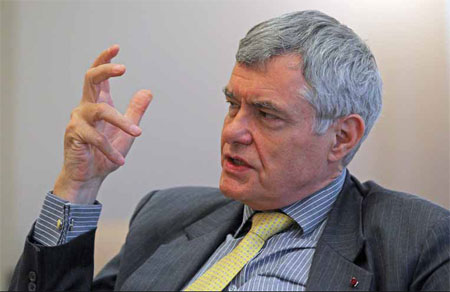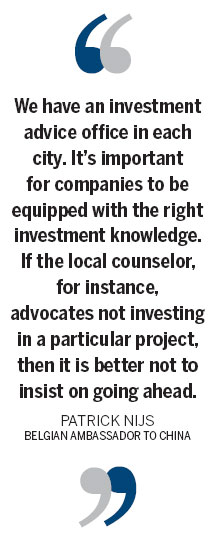The art of understanding

Belgian ambassador sees more opportunities to strengthen trade ties in Energy and urbanization
|

Patrick Nijs, the Belgian ambassador in China, says that it will still take some time for Western nations to accept a strong China. [Zou Hong / China Daily]
|
Representing Belgium's political and trade interests in China has not sapped Patrick Nijs' enthusiasm or fascination for the country. Rather it has only honed his understanding and perceptions of the nation, especially at a time when its economic strides have raised eyebrows in the West.
Nijs, the Belgian ambassador in China, says that it will still take some time for Western nations to accept a strong China. But it is inevitable, he says.
The ambassador's comments on China come at a time when Europe is reeling under a severe financial crisis and it is looking to China to prop up its sagging economy. Vice-Premier Li Keqiang's current visit to several European nations is seen as an important indicator of China's commitment toward Europe, say experts.
Nijs, however, says that to understand the Chinese way of things it is always important to understand the nation's philosophy, culture and history over the years. "This will help in getting used to the Chinese way and also provide answers to many of the issues."
To reiterate his point further, Nijs says, "the world is now more open and hence there will be more and more questions. We have to admit that we don't have the answers for all questions, and we don't know everything."
To understand China and its people, it is also important to understand Taoism, says Nijs, the core of which is living in harmony with the Tao, the source and essence of everything that exists.
"We need to share the answers with Chinese, listen to their voices and accept the differences. We have to face several challenges together, such as ecological and demographic issues."
During Vice-Premier Li's recent visit to Belgium, several important cooperation agreements were signed between the two nations. Prominent among them is the estimated $100 million (75.68 million euros) Belgium-China Direct Equity Investment Fund, or the Mirror Fund.
Another agreement aims to increase frozen bovine semen exports from Belgium to China.
Currently, China is Belgium's second largest trade partner outside the European Union, while Belgium is the sixth largest trade partner for China within the EU. Nijs, however, feels that there is still a lot that can be done to boost trade ties between the two nations.
At the same time, he says it is important for Chinese investors looking to establish a foothold in Europe to make their moves after a thorough understanding of the market.
"For Chinese investors, Belgium is a good investment destination as it has a favorable, open trading environment and the advantage of being an important hub for the whole European market," Nijs says.
Big Chinese companies, such as the major banks, should look to maximize their European investments by employing more local people, especially to some of the key management positions.

On the other hand, small and medium enterprises should join hands to explore the market together. "We have an investment advice office in each city. It's important for companies to be equipped with the right investment knowledge. If the local counselor, for instance, advocates not investing in a particular project, then it is better not to insist on going ahead," he says.
But that also does not mean that Chinese investors should stay away from Europe, considering that the financial climate is not all that rosy.
"The crisis has been generated by the media, and a financial crisis is different from an economic crisis," Nijs says. Investment programs related to energy and urbanization are still good bets in Belgium, he adds.
"Investors must also be in constant communication with the governments of both nations. I'd love to speak to everyone who is willing to do business in my country," Nijs says with a smile.
During the past 15 years of working in China, Nijs has lived in Shanghai, Hong Kong and Beijing. But he likes Beijing the most as he can converse in standard Chinese with taxi drivers and ride a bicycle in hutong.
However, there is one aspect of China that has left an indelible mark on Nijs. Not only is he Belgium's ambassador to China, but also the husband of a Chinese woman.
There is a saying that you fall in love with a place because you fall in love with a person who lives there. Before moving to China, Nijs was a diplomat in Japan. During a media interview in 1996, Nijs met his would-be wife in Japan.
"I didn't know then that she was Chinese. I was attracted by the beautiful Asian female journalist," Nijs says. One year later, he moved to China as the general consul in Shanghai when he was 47 years old. Moving to China was a tough decision at his age, but Nijs says it was the love for the country and the woman that prompted him to take the decision.
"I couldn't make it without her," Nijs adds. The couple with their two children currently stays in a sprawling Chinese-style mansion at the embassy compound in Beijing.
During weekends, it's mandatory for the family to converse only in Chinese at home. "My kids speak much better Chinese than I do and always make fun of me," Nijs says with a chuckle.
He says that his fascination with China really began during his student days. "I was always interested in the books on and from China and keen to learn Chinese art and language," says Nijs, who is in his early 60s.
Though China has witnessed a sea change since then, the ambassador says there are several new facets about the nation that keep him excited.
"The changes (in China) have been tremendous and breathtaking. So much has happened in China during the last 30 years, and there is no comparison elsewhere," he says.
Citing the example of the Pudong New Area in Shanghai, Nijs says that during the early 1990s, within a short period of time the whole area was dotted with skyscrapers.
Nijs says that when he first came to Suzhou, his wife's hometown, the hotels were not at all comfortable. Compared with his days in Japan, China then seemed far too noisy and crowded.
But all of that has changed now, Nijs says. "Cities like Beijing, Shanghai and Hong Kong are much more open and globalized. Chinese people in general are no longer afraid of communicating with foreigners, while the younger generation seems to be more at ease with English as a language."
As an important bridge of communication between China and Belgium, Nijs has hosted many events to enhance understanding between the two countries. But the most memorable event till date has been the Franco Dragone show in Wuhan last October, as part of the celebrations to commemorate the 40th anniversary of Sino-Belgian relations.
"We invited senior Chinese officials and Chinese people to the show to record the strong friendship between the two nations."
Contact the writer at zhaoyanrong@chinadaily.com.cn
Today's Top News
- Xi calls for promoting volunteer spirit to serve national rejuvenation
- Xi chairs CPC meeting to review report on central discipline inspection
- Reunification will only make Taiwan better
- Outline of Xi's thought on strengthening military published
- Targeted action plan to unleash consumption momentum
- Separatist plans of Lai slammed






























